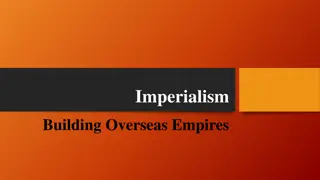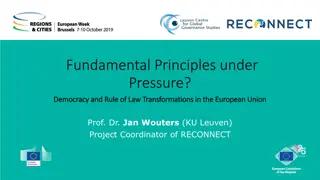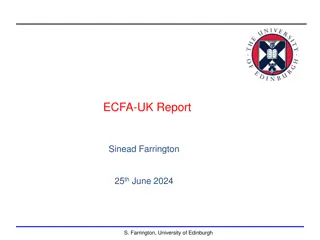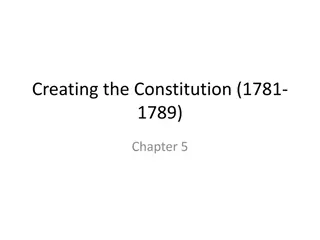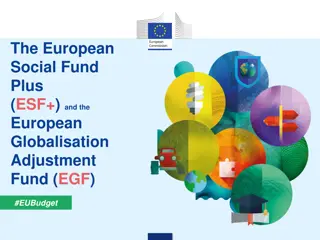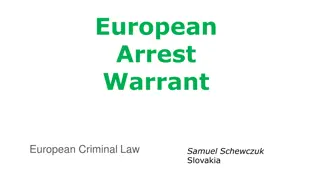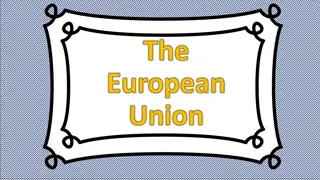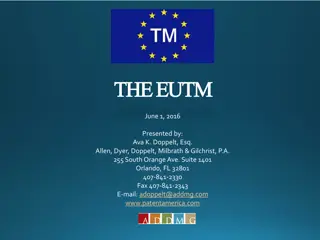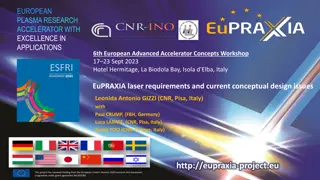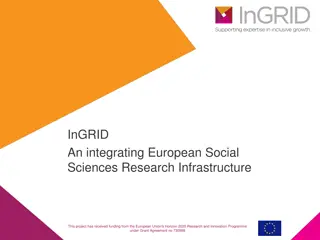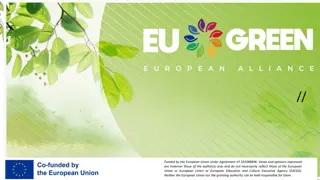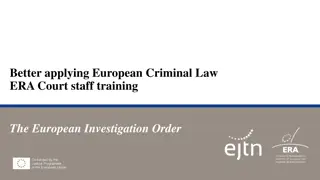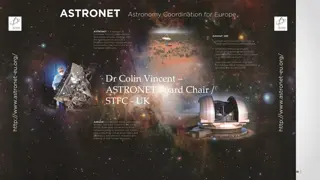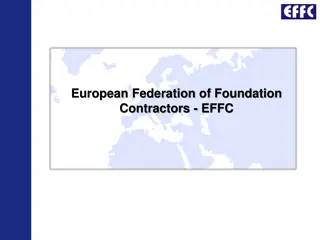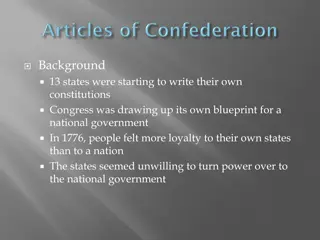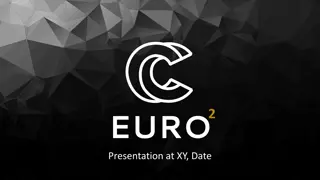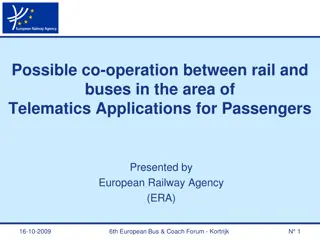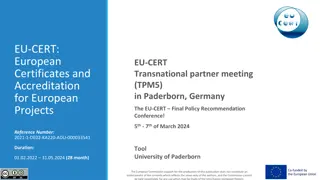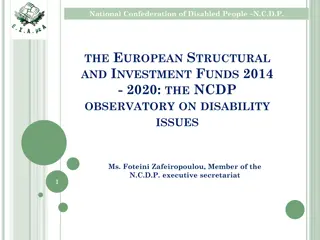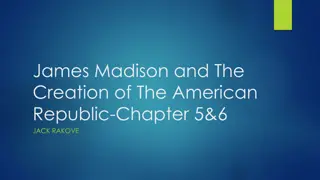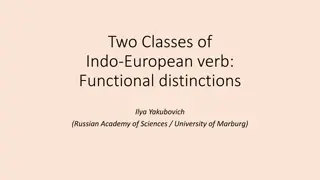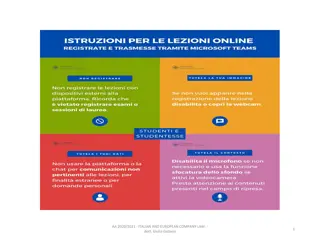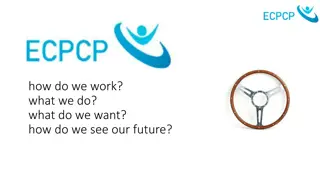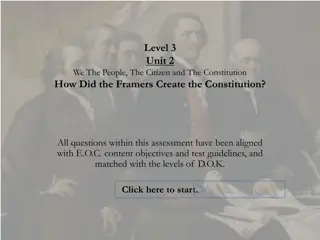Exploring the European Union and its Opportunities for Young People
The European Union (EU) is a political and economic union of 27 member states supporting lasting peace, human rights, freedom, and the free movement of people, goods, services, and capital. For young people, the EU offers job opportunities, youth events, travel and study opportunities, and initiativ
1 views • 18 slides
Shaping a New Nation: Challenges of the Articles of Confederation
Americans initially adopted the Articles of Confederation as their first government, but soon realized its weaknesses. The lack of a strong central authority, debate over power distribution, limitations on the national government's powers, and challenges in governing newly acquired lands were key is
2 views • 42 slides
European Institutional Response to COVID-19: Coordinative Europeanisation and Policy Recommendations
Dr. Stella Ladi from Queen Mary University of London and Panteion University, Athens, presented on the Coordinative Europeanisation during poly-crisis and the EU's institutional response to COVID-19. The presentation highlighted the recovery and resilience facility, the Schengen Area, and the import
0 views • 9 slides
Comparison of Government Systems: Unitary, Confederation, and Federal
The comparison of unitary, confederation, and federal government systems highlights how power is distributed between central and local authorities. In a unitary system, the central government holds most power, while local governments have limited autonomy. In confederation, local governments retain
0 views • 37 slides
Evolution from Articles of Confederation to U.S. Constitution
Following the Revolutionary War, the U.S. initially operated under the Articles of Confederation, which provided for a weak central government. However, due to issues such as financial problems and Shays' Rebellion, the Constitutional Convention was called in 1787. This led to the creation of the U.
0 views • 8 slides
Advancing Digital Transformation Through European Digital Identity Wallet Initiative
Facilitating digital transformation through the European Digital Identity Wallet initiative is crucial for enhancing trust, privacy, and security in online interactions. By prioritizing user-friendly solutions, data control, security measures, and inclusive implementation, the initiative aims to pro
1 views • 6 slides
European Imperialism in the Late 19th Century
European nations in the late 1800s pursued imperialism to expand their empires for economic, political, and social reasons. Motives included economic interests, political and military ambitions, and the ideology of Social Darwinism. The Industrial Revolution fueled the need for resources and markets
1 views • 14 slides
Understanding the Weaknesses of the Articles of Confederation
The Articles of Confederation established a weak national government by creating a structure with significant limitations. The central government had no executive or judicial branches, lacked the power to collect taxes, and faced challenges in making decisions and enforcing laws. States held conside
0 views • 15 slides
Democracy and Rule of Law Transformations in the European Union
Democracy and the rule of law in the European Union are facing challenges such as backsliding and low voter turnout. This article discusses tools the EU can use to address these crises, ways to strengthen the link between the European Parliament and its citizens, factors affecting voter turnout in E
0 views • 10 slides
Overview of ECFA-UK: European Committee for Future Accelerators and its Activities
ECFA-UK, the European Committee for Future Accelerators, consists of members from prestigious institutions in the UK like Oxford, Edinburgh, Bristol, RAL, Glasgow, Cambridge, and UCL. The committee's main objective is to assess and ensure the well-being of the particle physics field in Europe and en
1 views • 11 slides
The Evolution of Governance in the United States (1781-1789)
This chapter explores the pivotal period from 1781 to 1789 in US history, focusing on the creation of the Constitution. It covers the challenges of the Articles of Confederation, the legislative branches, freedom of religion controversies, financial weaknesses, events like Shays' Rebellion, and the
0 views • 30 slides
Exploring Early American Civilizations and European Impact
Discover the Columbian Exchange, Early American Civilizations like Aztec, Inca, and Maya, Inca civilization characteristics, European Exploration impact on Native Americans, and motives for European Expansionism. Learn about technologies aiding European exploration and the economic concept of mercan
0 views • 26 slides
The European Social Fund Plus (ESF+) and European Globalisation Adjustment Fund (EGF) in EU Budget
The European Social Fund Plus (ESF+) plays a crucial role in addressing evolving technology, productivity, and globalisation challenges by supporting education, training, employment, and social inclusion initiatives. With an allocation of 101.2 billion euros, ESF+ aims to promote a more social Europ
3 views • 8 slides
Challenges in Promoting Collective Bargaining and Fighting Anti-Union Busting
The European Trade Union Confederation (ETUC) highlights the importance of the Directive on adequate minimum wages in the EU to combat union busting practices. While the Directive addresses some demands related to promoting collective bargaining, there is a need for further strengthening to effectiv
0 views • 13 slides
European Arrest Warrants and Legal Framework in European Criminal Law
Description of two cases involving European Arrest Warrants - one for theft in Hungary and the other for driving without a license in Romania. The cases raise preliminary questions about the execution of European Arrest Warrants and detention conditions in issuing Member States.
0 views • 20 slides
Understanding the European Union: Benefits and Structure
The European Union (EU) is a confederation where member countries work together for mutual advantages, such as increased competitiveness in the world market. While the EU does not handle all government functions, it offers benefits like a common currency (Euro) for easy trade and the freedom of move
0 views • 18 slides
The Evolution of European Union Trademarks: A Journey Through History
Exploring the transformation of European Union Trademarks (EUTM) from their inception to the present day, this narrative delves into the political and economic foundations of the European Union. From the establishment of the European Economic Community in 1958 to the development of a single market a
0 views • 38 slides
European Plasma Research Accelerator with Excellence in Applications
The European Plasma Research Accelerator project, also known as EuPRAXIA, is a cutting-edge initiative that aims to develop a laser driver for advanced accelerator concepts. Led by a team of experts from various European countries, the project focuses on laser requirements, overall layout, thermal m
0 views • 33 slides
Challenges and Innovations in Mental Health Community Services within European Countries
The European Network of (Ex-)Users and Survivors of Psychiatry, consisting of 36 member organizations across 28 European countries, is advocating for improved mental health care systems. They are addressing issues such as forced hospitalizations, coercive measures, and the trauma experienced by indi
0 views • 17 slides
InGRID - Integrating European Social Sciences Research Infrastructure
InGRID is a European project funded by the EU's Horizon 2020 programme aimed at integrating social sciences research infrastructures. It provides resources and services for data analysis, storage, and more to support the social sciences community in areas such as working conditions, poverty, and vul
0 views • 8 slides
Institutional Framework and Antitrust Law in the EU
The European Union's institutional framework is defined by the Treaties of Lisbon, European Union, and Functioning of European Union. These treaties establish the EU's objectives, governance principles, and delineate competences. Additionally, EU antitrust law principles are based on the Treaties of
0 views • 16 slides
Empowering European SMEs for Sustainable Transition: Insights from Generali SME EnterPRIZE White Paper
European SMEs play a crucial role in the EU Sustainable Agenda. The Generali SME EnterPRIZE White Paper focuses on analyzing the sustainability approach of European SMEs, identifying barriers, and mapping drivers for their sustainable transition. The strategic importance of sustainability for SMEs i
1 views • 5 slides
European Union Funded Project Presentation with Image Slides
This presentation features various image slides funded by the European Union under Agreement n. 101089896. The views and opinions expressed in the slides are solely those of the author(s) and do not necessarily reflect those of the European Union or European Education and Culture Executive Agency (E
0 views • 8 slides
Understanding European Criminal Law: European Investigation Order Training
Enhance knowledge on applying European Criminal Law through ERA Court staff training on the European Investigation Order. Explore the scope, definitions, recognition, and execution processes, along with legal remedies and obligations. Deadline details, relationship with legal instruments, and the Di
0 views • 14 slides
Comprehensive European Astronomy Development Planning by ASTRONET
ASTRONET, a group of European funding agencies and infrastructures, coordinates all aspects of European astronomy. Established in the early 2000s with EU funding, ASTRONET focuses on long-term planning for the development of European astronomy. It has created the European Science Vision and Infrastr
1 views • 7 slides
European Federation of Foundation Contractors (EFFC): Promoting Excellence in Special Foundations Across Europe
The European Federation of Foundation Contractors (EFFC) represents specialist foundation contractors from 16 European countries, working towards achieving high professional standards in the industry. Through a network of members, the EFFC aims to enhance workmanship, technical competence, safety, a
0 views • 14 slides
Challenges in Crafting the Articles of Confederation
Thirteen states were crafting their own constitutions, while Congress aimed to establish a national government in 1776. Loyalty to states over a nation hindered power transfer to the national government. Land disputes and state refusals delayed the ratification of the Articles of Confederation, lead
0 views • 10 slides
European High-Performance Computing Project Funding Presentation
A presentation showcasing slides related to the European High-Performance Computing Joint Undertaking project, detailing funding information and support received from the Digital Europe Programme and various countries under the Horizon 2020 programme of the European Union. The slides feature images
0 views • 6 slides
European Unemployment: Outcomes and Outlook Analysis
Prakash Loungani, an advisor at the IMF, presents a comprehensive analysis of European unemployment rates, outlining the dire outlook and discussing whether the issue is cyclical or structural. The presentation includes data on unemployment rates in various European countries, changes in unemploymen
0 views • 26 slides
European Railway Agency's Role in Promoting Cooperation between Rail and Buses in Telematics Applications
The European Railway Agency (ERA) plays a crucial role in enhancing cooperation between rail and buses through Telematics Applications. Established in 2004, ERA focuses on recommending legislation, ensuring interoperability, and enhancing safety in the European rail network. Recommendations made by
0 views • 17 slides
EU-CERT: European Certificates and Accreditation for European Projects
The EU-CERT project involves European Certificates and Accreditation for European Projects, with upcoming events like the Transnational Partner Meeting (TPM5) in Paderborn, Germany, and the Final Policy Recommendation Conference in March 2024. The accreditation website tool and related information a
0 views • 4 slides
Comparison of Unitary, Confederation, and Federal Government Systems
The unitary government system centralizes power in the central government, confederation delegates power to local governments, and federal shares power between levels of government. Examples like Saudi Arabia (unitary), confederation (decentralized power), and the USA (federal) showcase these system
0 views • 36 slides
National Confederation of Disabled People (NCDP) Initiatives for Disability Inclusion and Accessibility
The National Confederation of Disabled People (NCDP) plays a crucial role in promoting disability rights and accessibility in Greece by actively engaging in the implementation of European Structural and Investment Funds. Through their involvement in policy development, training initiatives, and advo
0 views • 9 slides
Evolution of American Governance: From Articles of Confederation to Constitutional Convention
Explore the transition from the Articles of Confederation to the Constitutional Convention shaped by assumptions about government after the Revolution. Discover how James Madison identified problems with the Articles, leading to key issues like representation, federalism, executive responsibilities,
0 views • 11 slides
Functional and Lexical Distribution of Indo-European Verbs
Investigating the functional and lexical distribution of Indo-European verb classes, this research delves into the mi- and xa-conjugations in Proto-Indo-European, new discoveries in the preterit of the xa-conjugation, paradigms in Hittite, perfect and middle endings in Late Indo-European, and the ch
0 views • 18 slides
European Deposit Insurance Scheme (EDIS) - Towards a Safer Banking Industry in Europe
The European Commission initiated the European Deposit Insurance Scheme (EDIS) to strengthen confidence in the banking industry in Europe, solidifying the European monetary union. EDIS will be phased in from 2017 to 2024, providing more stability for European depositors and addressing potential pitf
0 views • 10 slides
Weaknesses of the Articles of Confederation and Land Policies Explained
The weaknesses of the Articles of Confederation, including the lack of provision for adding new states, the Land Ordinance of 1785, and the Northwest Ordinance of 1787, are explored. The reasons behind these weaknesses are discussed, shedding light on the challenges faced by the early American gover
0 views • 8 slides
Italian and European Company Law: Key Insights for 2020/2021
Delve into the intricacies of Italian and European company law for the academic year 2020/2021 with Dott. Giulia Gabassi. Explore topics such as European Economic Interest Grouping (EEIG), European legislation, Court of Justice regulations, directives, and uniform models. Understand the importance o
0 views • 88 slides
Exploring ECPCP: Who We Are, How We Work, and Our Future Vision
Discover the European Confederation of Primary Care Paediatricians (ECPCP), its history, leadership, growth, and meetings. Learn about the challenges faced in certain countries and the unique position of ECPCP as an independent association with strong relationships to other healthcare organizations.
0 views • 25 slides
Understanding the Formation of the Constitution
Exploring the Articles of Confederation, confederation systems, and insights from George Washington regarding government energy in establishing the Constitution.
0 views • 77 slides






